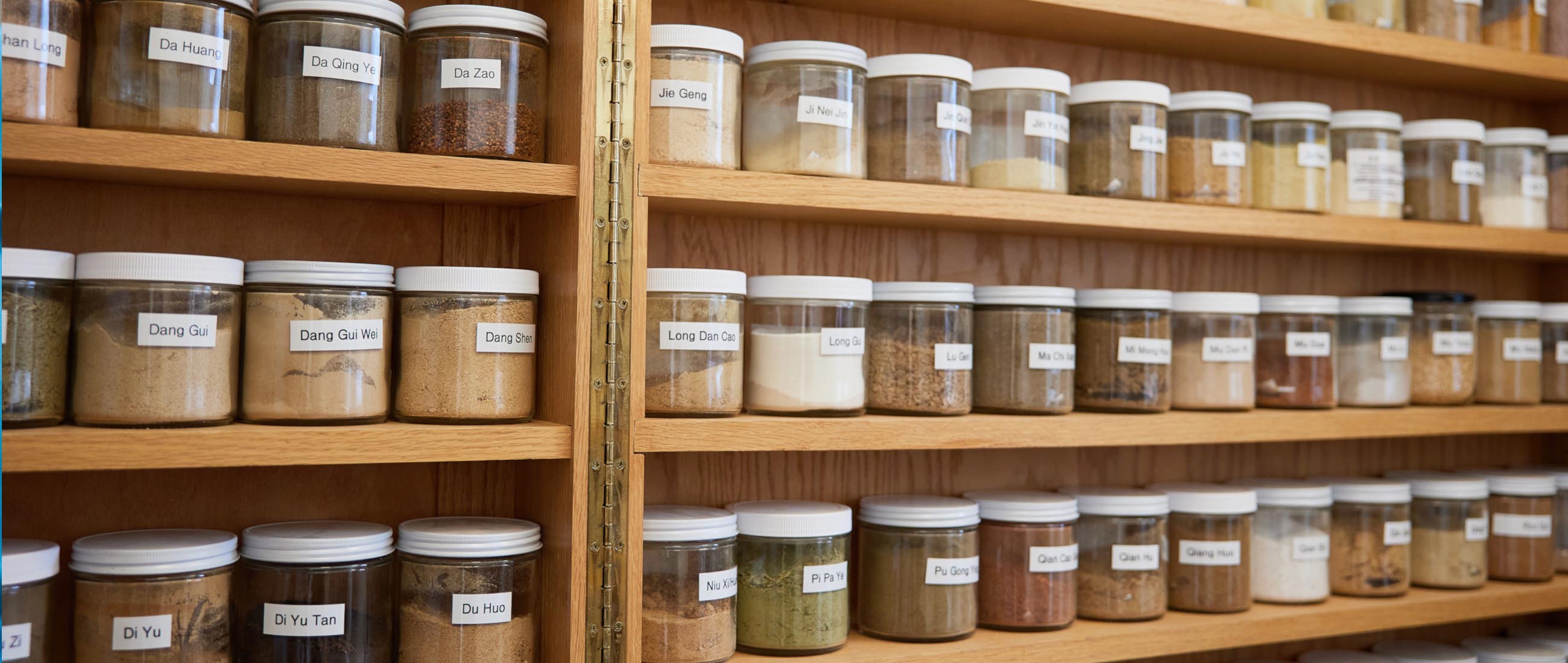
Your Chinese Herbal Formula: Information & Instructions

Your Chinese Herbal Formula: Information & Instructions
In 2023, we began using a new type of herbs in our herbal pharmacy. Well, it's new to us. The method itself is thousands of years old! Instead of the pre-cooked, dehydrated granule concentrates that we had been prescribing, we're preparing herbal formulations from traditionally-processed and dried herbs that we grind into powders in-house.
Learn more about why we changed our herbal pharmacy process by reading a short story or the full story.
Common questions (and answers!) about Chinese herbal medicine.
How to prepare your Chinese herbal medicine tea
Thermos soak method
We love and recommend this method because it’s simple and effective.
If the Thermos soak 4+ hours REQUIRED box is checked on your herb label, you MUST use this method in order to safely prepare your herbs.
Tools needed:
10-16 oz stainless steel thermos or insulated bottle. Any insulated thermos will work. Here, we use my kids' old soup thermos.
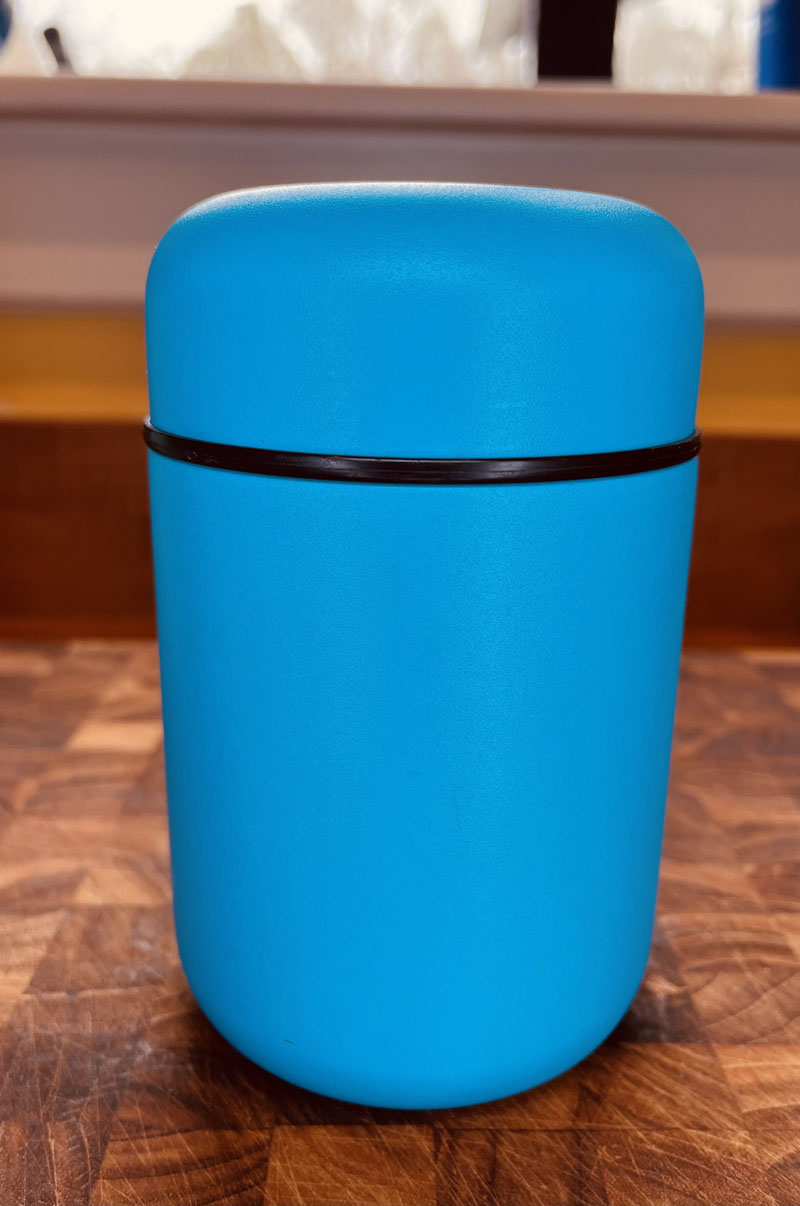
Straining device such as a fine mesh metal strainer (cheesecloth will work, but it's messier)
A cup or mug
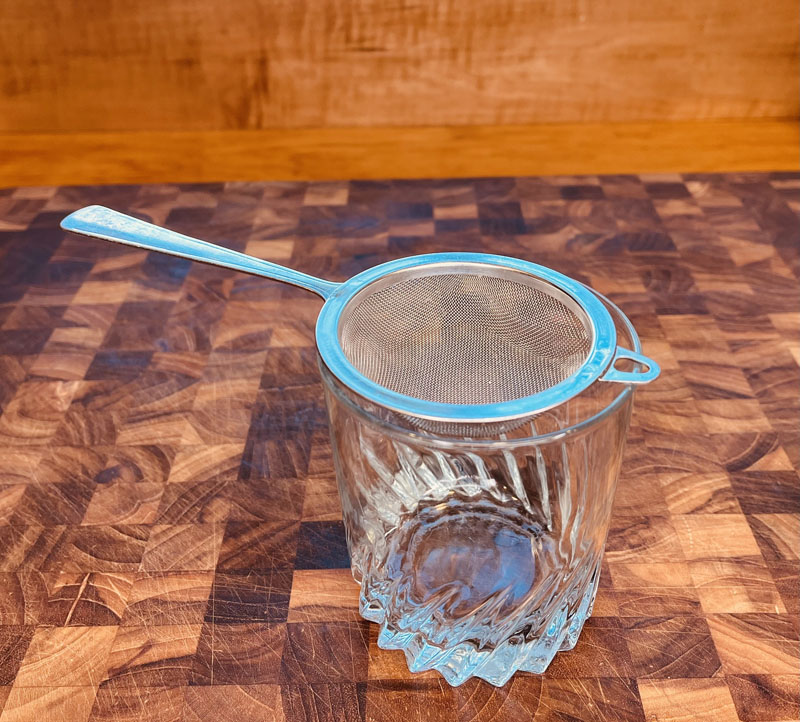
Directions:
1. When you get home, transfer and store the herbs into a CLEAN and DRY jar with lid. Shake the jar/mixture before use, to prevent settling or uneven distribution.
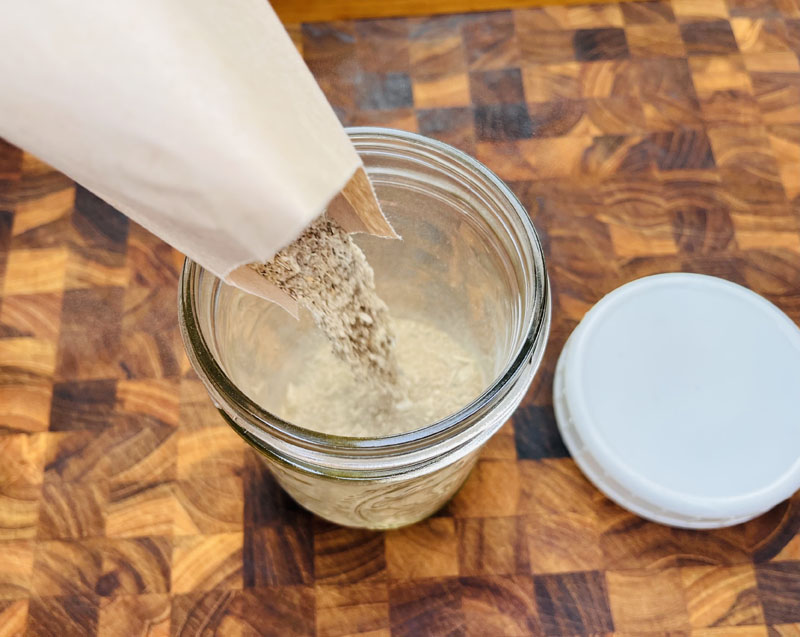
Any jar will work, as long as it's CLEAN AND DRY. Did we say "Clean and Dry" enough times?
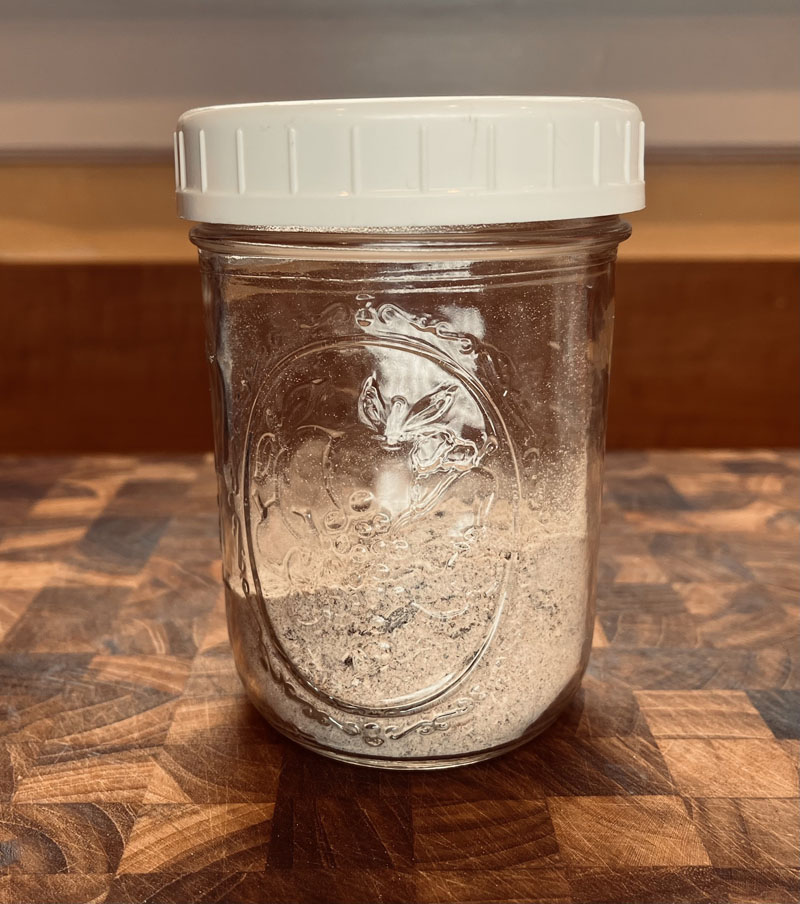
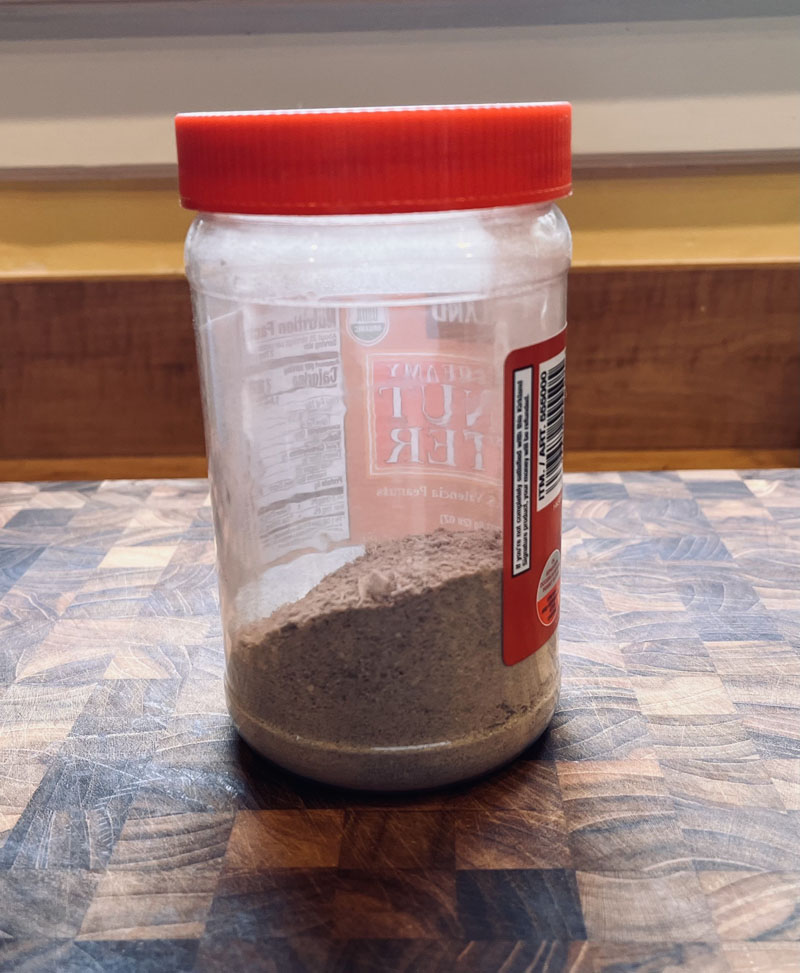
2. Add the daily dose of herbal powder specified on your instruction card to thermos or insulated bottle. The dose will vary between 1 tsp to 1 Tbsp, depending on density of the formula.
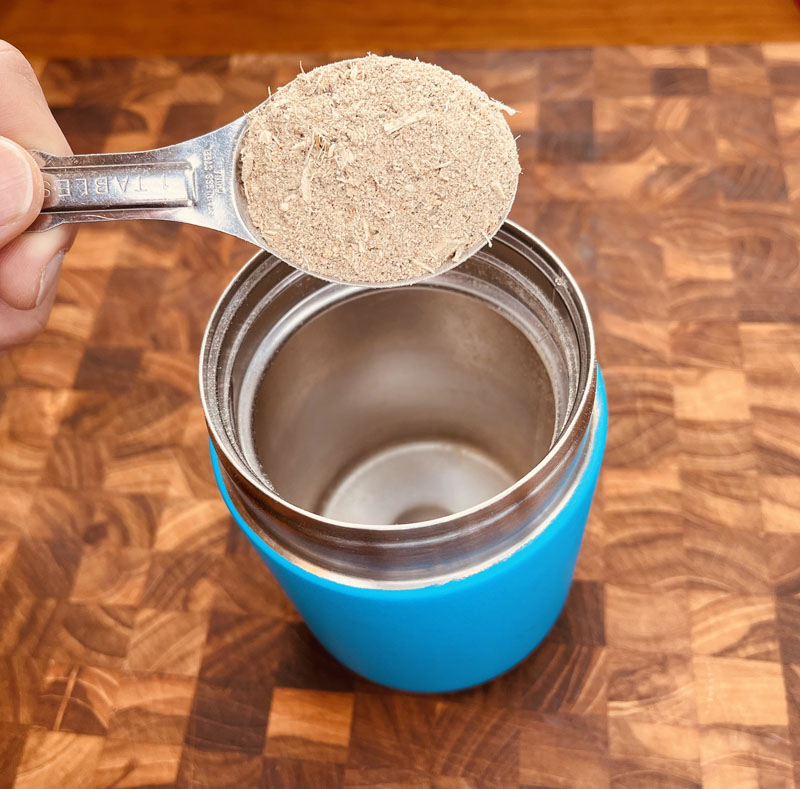
3. Add 10-12 oz (1¼ - 1½ cup) boiling water into thermos. Make sure all herbs are submerged.
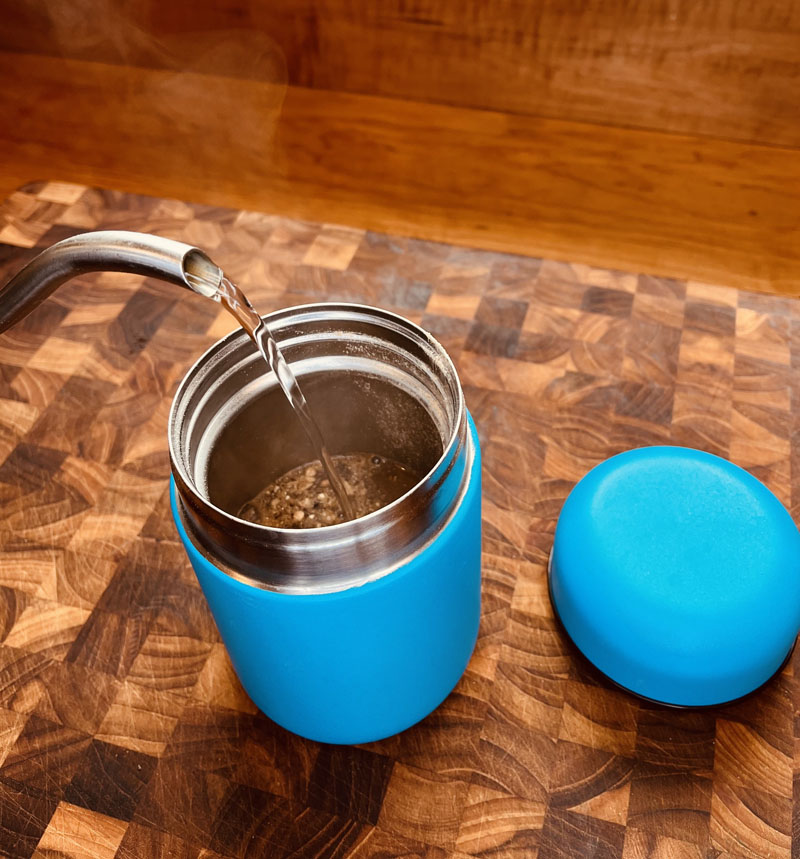
4. Close lid on thermos. *Warning: Some thermos lids form a tight suction. If you don't have Hulk grip strength, then JUST SET THE LID ON TOP OF THERMOS WITHOUT TWISTING, or just set the lid LOOSELY on top with a TINY twist.
Let sit at least 4 hours, or up to 12 hours.
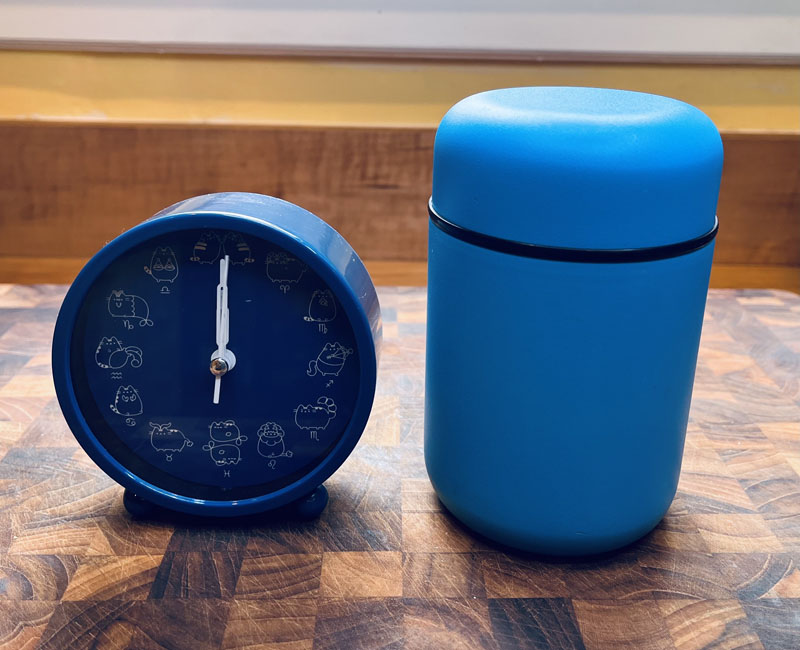
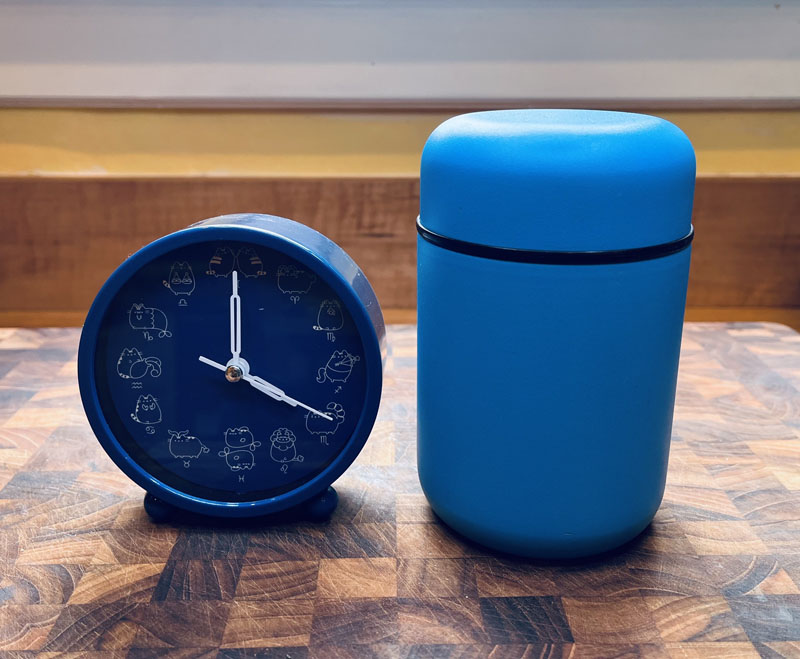
5. Your herbs are ready after 4+ hours of soaking. Set strainer device over a cup. Strain herbal decoction.
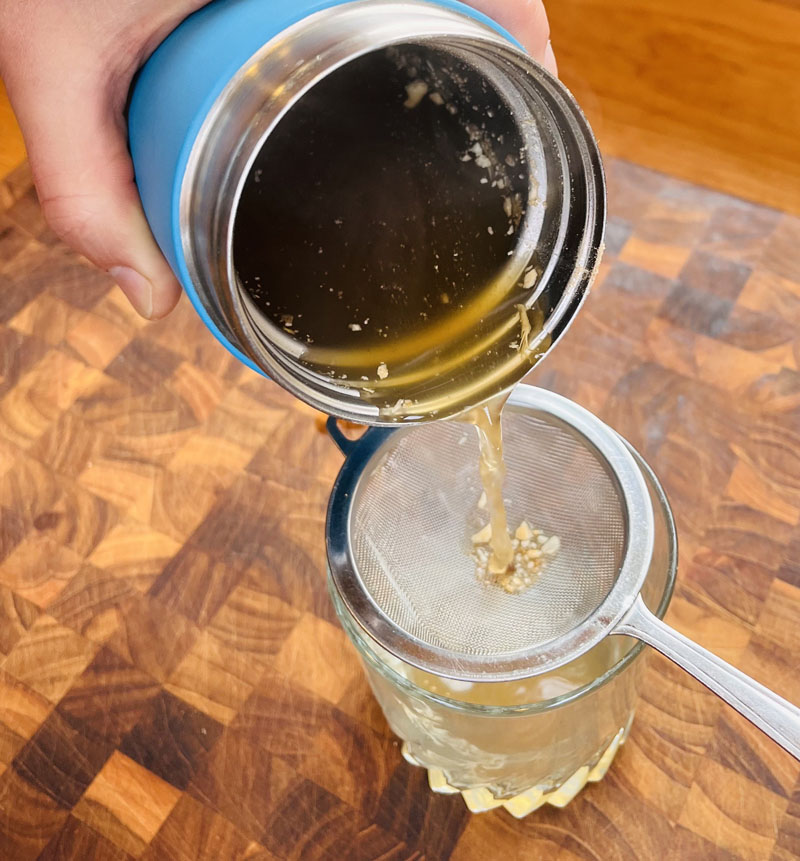
6. This is your herbal medicine for one day. DO NOT INGEST the filtered herbal solids!
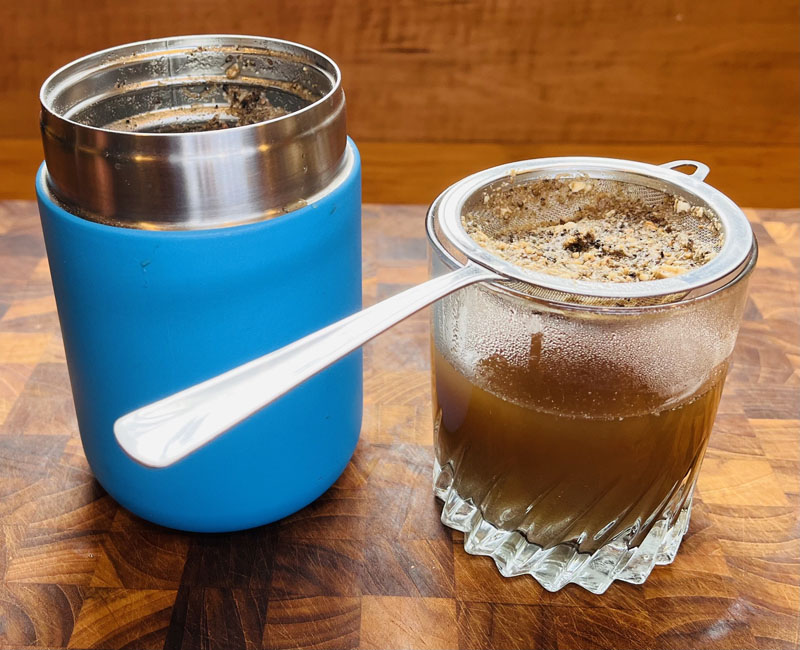
(Yes, please compost the herbal solids!)

Dosage:
If your practitioner gave instructions for special dosing, follow those instructions.
Otherwise, this is the most common dosing regimen: Take the herbal liquid in 2 different doses separated by at least 6 hours.
It can be taken when still warm from the thermos, or at room temperature. If you prefer it warm, gently reheat on stovetop or add a splash of hot water (it will be slightly more dilute, but that is ok).
Typically, it does not matter if herbs are taken with or without food. People with sensitive digestion may prefer to take it after meals. Your practitioner will specify dosing times if needed.
Stovetop method
This method is convenient and doesn't require planning ahead. It can be used for all formulas except when your practitioner specifically indicates that you need the Long-soak method. You are basically cooking herbs on the stovetop for 5-10 minutes.
Tools needed:
A small stainless steel saucepan
Straining device such as a fine mesh metal strainer (cheesecloth will work, but it's messier)
A cup or mug
Directions:
Add ~12-16 oz (1 ½ - 2 cups) water and the daily dose of herbal powder specified on your instruction card (it will vary between 1 tsp to 1 Tbsp, depending on density of the formula) to stainless steel saucepan. Stir to de-clump herbs.
On a stovetop, bring water-herb mixture to a boil, then simmer on medium-low for 5-10 minutes.
Set strainer device over a mug. Strain herbal decoction. This is your herbal dose for one day. Do not ingest the filtered herbal solids! (see photos from steps 5-6 above)
Dosage:
If your practitioner gave instructions for special dosing, follow those instructions.
Otherwise, this is the most common dosing regimen: Take the herbal liquid in 2 different doses separated by at least 6 hours.
It can be taken when still warm from the thermos, or at room temperature. If you prefer it warm, gently reheat on stovetop or add a splash of hot water (it will be slightly more dilute, but that is ok).
Typically, it does not matter if herbs are taken with or without food. People with sensitive digestion may prefer to take it after meals. Your practitioner will specify dosing times if needed.
Our pharmacy story
The Meridian Health Solutions herbal pharmacy grinds our own herbal powders in-house in order to dispense herbal formulations in the most traditionally-processed style. Why did we add all this work to our pharmacy operations?
Traditional powders have many benefits over dehydrated granules, with the only downside being that preparation takes slightly more effort. Powders are more effective than granules, they also taste better, have a lower carbon footprint, and contain no fillers. We believe taking traditional powdered herbs is more closely aligned with how Chinese herbal medicine was consumed when the art and science developed over 2,000 years ago and leads to better treatment outcomes.
How we arrived at the Traditional Powder Method
Most people who have some familiarity with Traditional Chinese Herbal Medicine know that customized herbal formulas are boiled for 30-60 minutes and then strained before drinking. This method, though effective, takes time, makes the whole house smell herby, requires large amounts of raw herbs (making it more expensive), and has fallen out of favor in the last few decades.
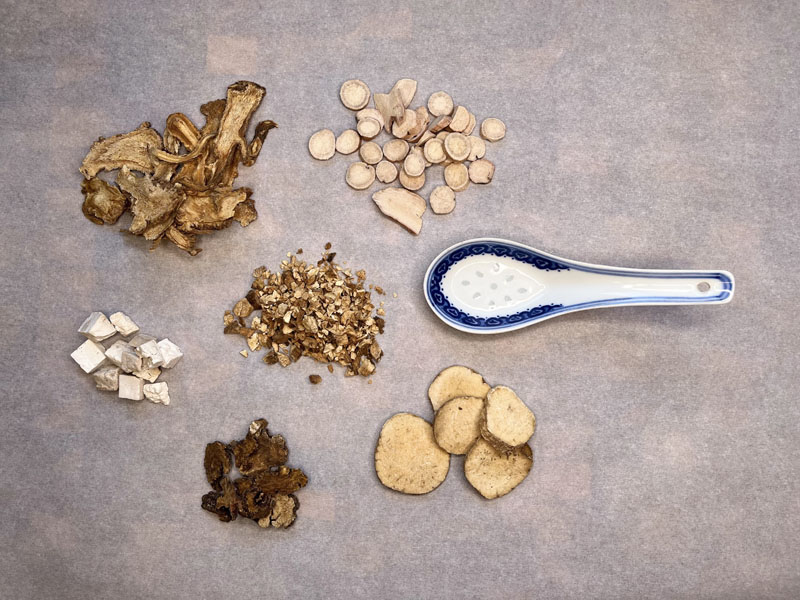
Traditional herbal formula: Dang Gui Shao Yao San bulk dose that needs to be cooked daily.
In place of raw herbs, concentrated dehydrated granules became a popular way to consume Chinese Herbal Medicines. This method made taking Chinese herbs more convenient. Herbal granule manufacturers cook down (i.e. concentrate) each herb, and bottle the dehydrated granules, while the herbalists prepare customized formulas by combining granules from individual herbs. Instead of taking an hour to cook the day’s herbal formula, the patient simply mixes their prescribed granular formula with hot water. Compliance definitely increased!
But researchers who compared the treatment effects of traditional and granule methods saw that granules were less effective. In addition, the granules need a binder – usually potato or corn starch – to prevent clumping. People who have sensitivities to these starches are unable to use granular herbal prescriptions.
Enter Traditional Powders! Powdered herbal formulas were introduced in the Han Dynasty (200 CE) and have been used widely since the Song Dynasty, over 1,000 years ago. The pioneering herbalists figured out that grinding herbs into powders improved the extraction of active ingredients, making it possible to get excellent clinical results from much smaller amounts of herbal medicine.
In the early days of this approach, grinding dried herbs into a fine powder was a labor-intensive endeavor. Now, specialized electric grinders make this process much simpler! We are able to turn this:
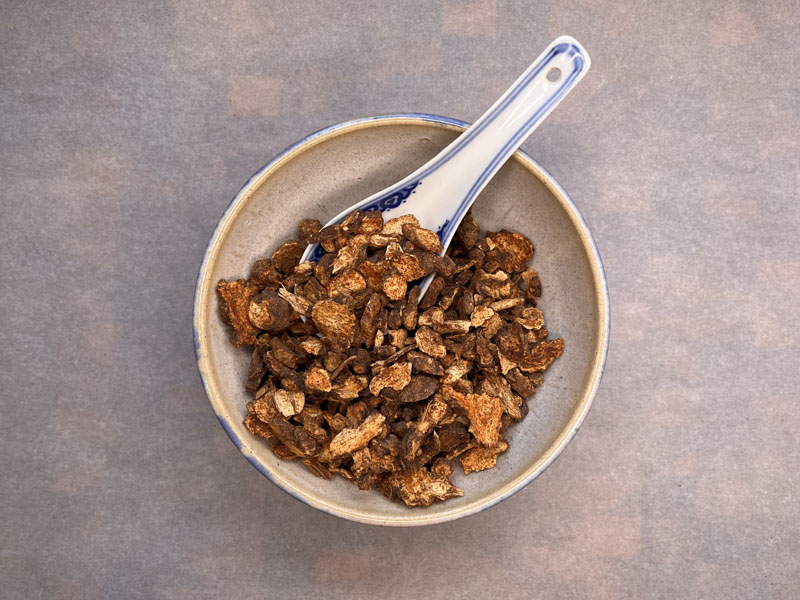
Cang Zhu, Red Atractylodis Rhizome, in dried bulk format
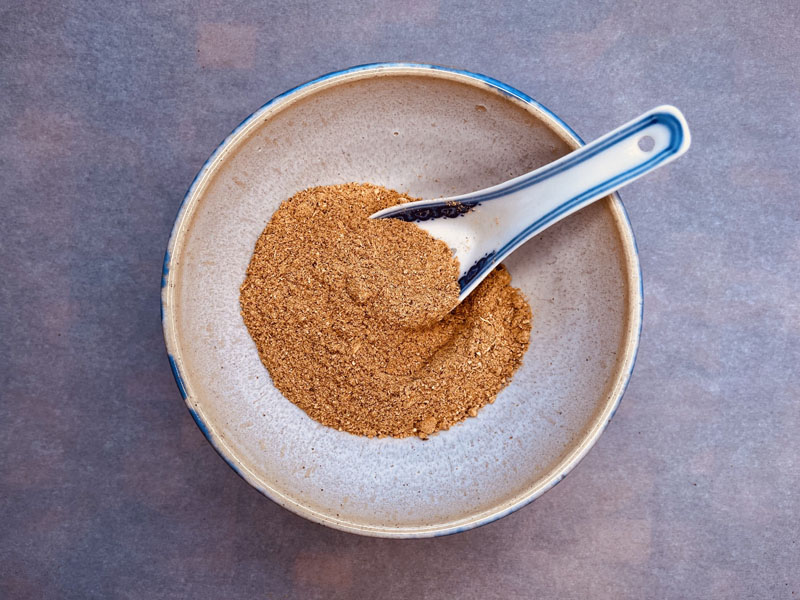
into this, in less than a minute!
Cang Zhu, Red Atractylodis Rhizome, powdered in-house
Which means we can offer you customized herbal formula powders that don’t contain any binders!
We’re super excited for this change in our pharmacy because:
It’s convenient
With the right tools, brewing up your herbs is super easy. We recommend the Thermos soaking method, which takes less than 5 minutes per day of active prep time.
Same results with smaller dose = less $
A typical (unground) bulk herbal formula uses 50-150 grams of herbs per day. When herbs are ground and brewed correctly, only 6-10 grams per day is needed to achieve the same clinical effects. This means it's not only more convenient, but also way less costly.
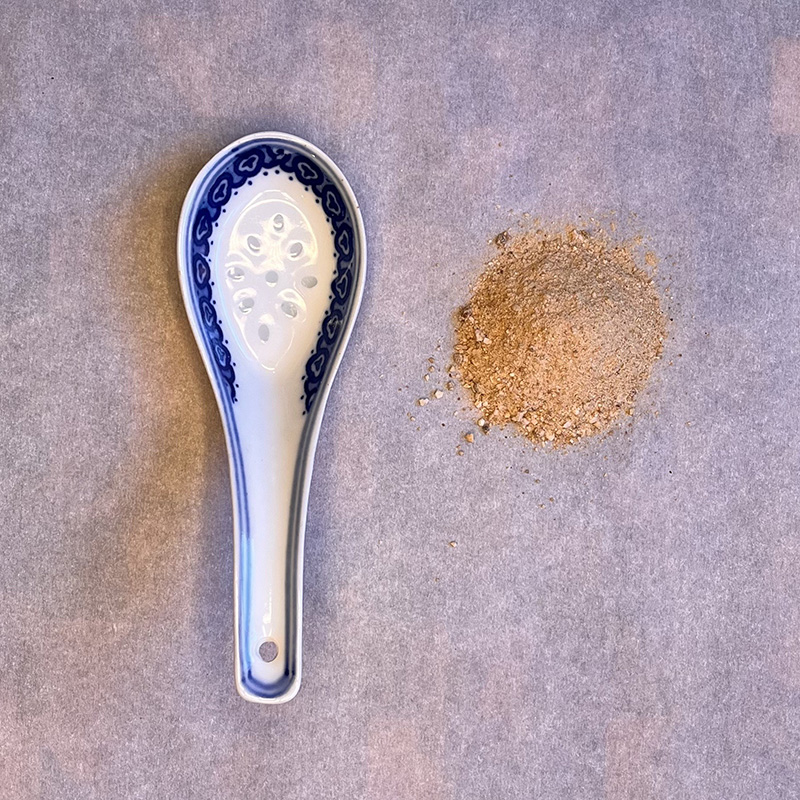
Traditional herbal formula: Dang Gui Shao Yao San powdered dose that needs to be soaked daily.
It tastes less processed, more authentic (and better!)
Traditional powders don’t contain any starchy binders, so the formula won’t have a thick sludgy consistency.
Traditional powders are made directly from the dried herbs, so the ingredients are much more aromatic and flavorful, rather than being a muted processed product.
As Fang’s mom says, “This is what real Chinese herbal medicine tastes like. The other stuff [concentrated granules] was like fast food.”
Let us know if you can smell and taste the difference!
The active ingredients are more bioavailable
Boiling or soaking the powders has been shown to increase active compound extraction by up to 1.4 fold as compared to boiling the crude herbs; and decreases loss of volatile compounds that otherwise evaporate in conventional cooking (Liu et al, 2015).
More effective
All of the above reasons make traditional powdered herbal formulas more clinically effective. Our families, patients, and colleagues have all reported improved results; we are confident you will too!
Better for the environment
And for anyone who cares about the planet… making our own herbal powders means we’re using thousands fewer plastic bottles per year. It reduces our and your carbon footprint in not consuming the manufacturing and shipping of processed herbs.
We hope you enjoy and benefit from the traditional powdered herbs!
Common questions (and answers!) about Chinese herbal medicine
How long do I need to take these herbs for?
It depends on your health condition and the purpose of your herbal formula. For acute issues like sinus congestion or an inflamed bug bite, you may only need herbs for a few days. But if you're taking herbs to address long-standing problems, you may need them for weeks or months, or until the problem resolves.
How do I know if the herbs are working?
You should have had a clear conversation with your practitioner about what the herbs are for, and changes to look for so you know if they're working or not. For example, if you're working on sleep, how are you sleeping? If indigestion, is it still going on? Has it changed in severity? What YOU feel is always the most important indication of if the herbs are working, although your practitioner will check in wth you to figure out more specifics, and modify the formula if needed.
Should I stop taking other herbs/vitamins?
Please always tell your practitioner what other herbs or supplements you're taking. Your practitioner will guide you about what to continue and what to stop.
Should I stop taking my prescription medications?
DO NOT STOP your prescription medications. As long as we know the prescription meds you're on, your practitioner will have checked to make sure that your Chinese herbal formula is ok to take in conjunction.
Often, people come to us with the goal of decreasing or stopping their prescription medications, so they ask us how to get off. But prescription medications are outside of our scope of practice, and we cannot give you that guidance; please consult with your prescribing physician.
What is in my herbal formula?
Chinese herbal formulas are typically composed of somewhere between 5-15 individual herbs, forming a synergistic effect that addresses your whole-person pattern. If you are curious about the contents of your formula, just ask! Your practitioner would be happy to give you a list.
I've heard about product contamination. Are my herbs clean or safe?
We've always cared about this very real issue. That's why we only work with like-minded suppliers who are transparent about testing and quality control. Most of our herbs come from Spring Wind or NuHerbs, both companies that value sustainable growing, geo-authentication, proper post-harvest processing, and contaminant testing. We buy organic and premium-grade herbs whenever possible (more than 95% of the time). The companies have transparent practices when an herb has contamination, so we can make the choice about what to incude in our pharmacy.
The most direct way to say it is: we only dispense herbs of high enough quality that we ourselves want to take, and feel good giving to our families.
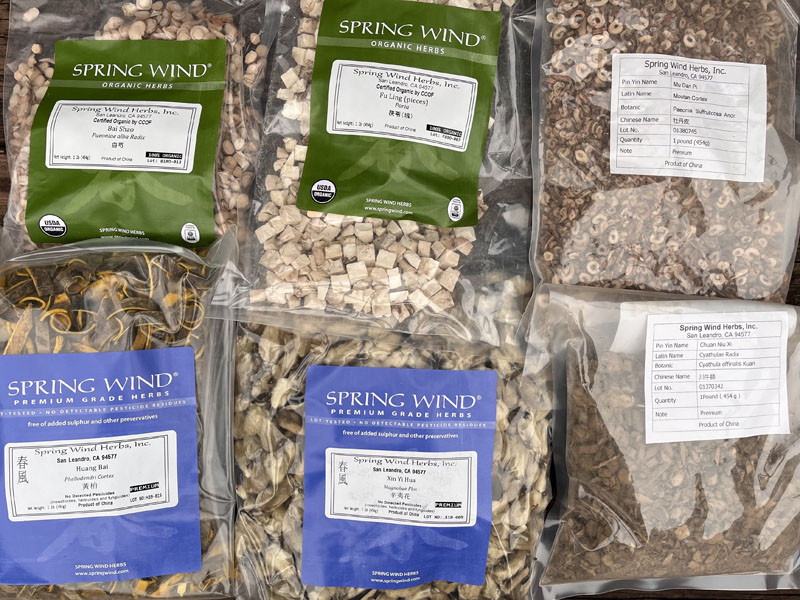
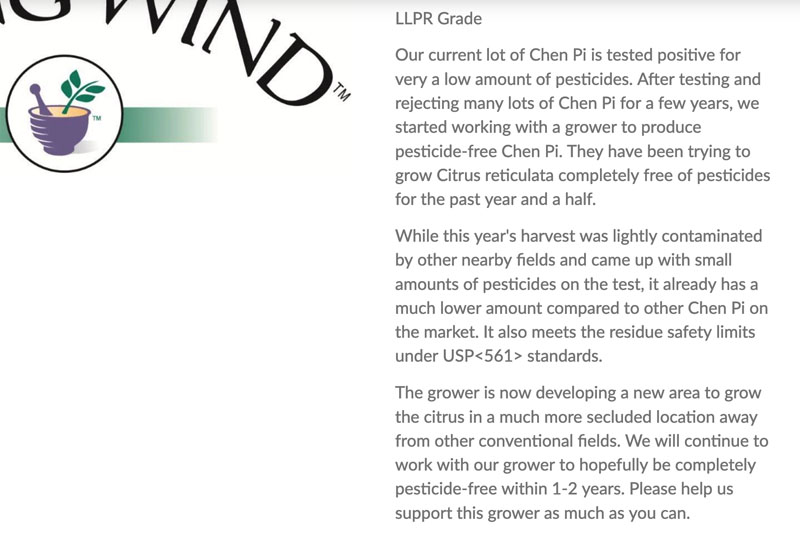
Sources:
Liu et al. Review of the powder and decoction formulae in Traditional Chinese Medicine based on pharmacologically active substances and clinical evidence. J Traditional Chin Med 2015 June 15; 35(3): 355-360
